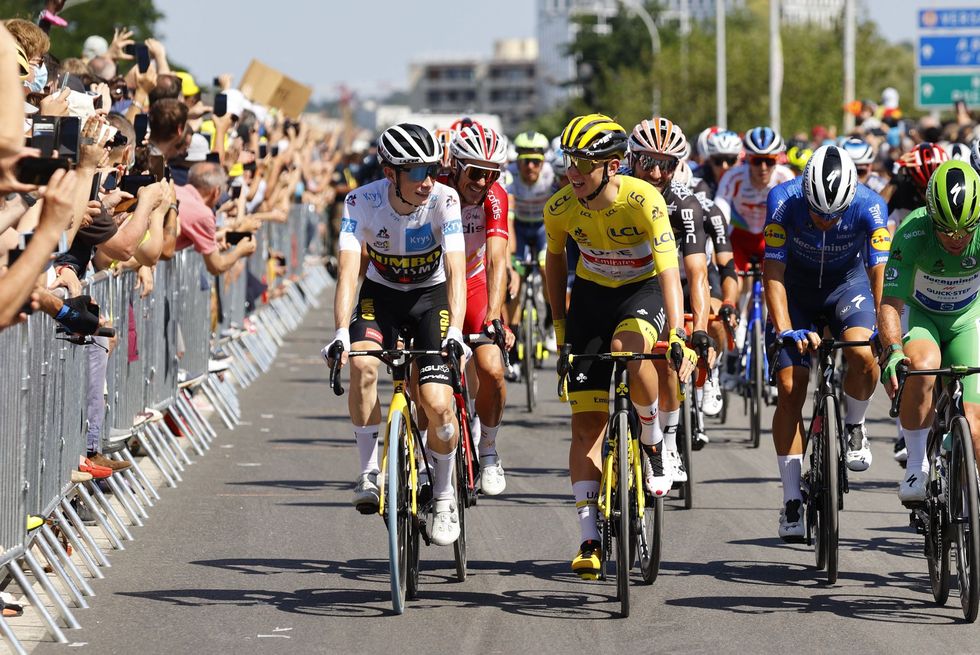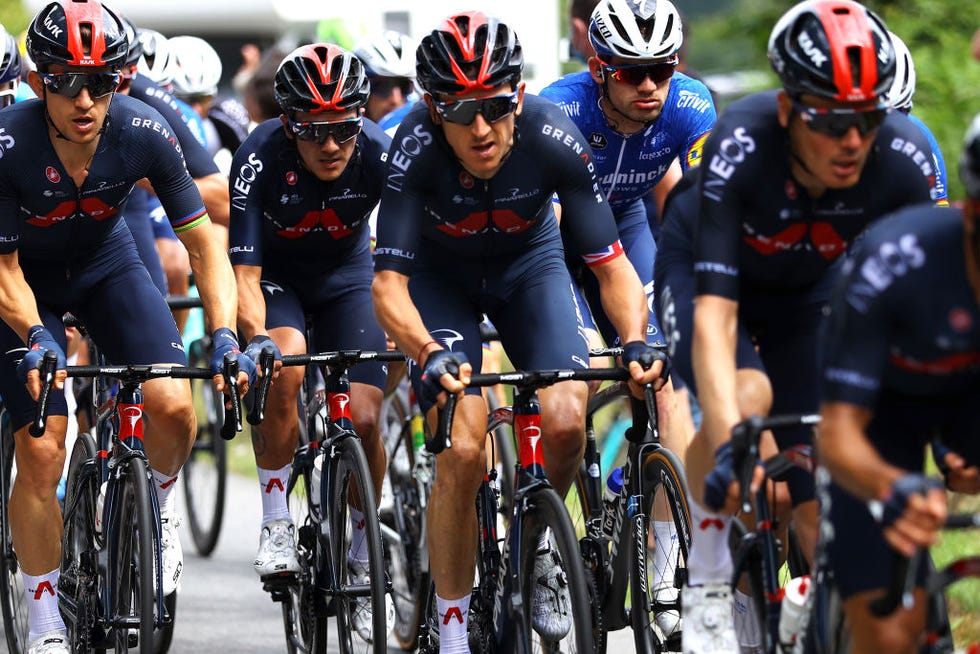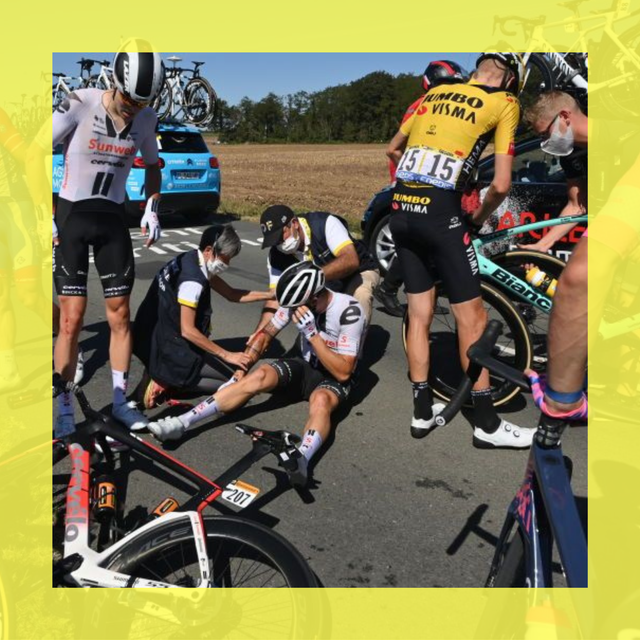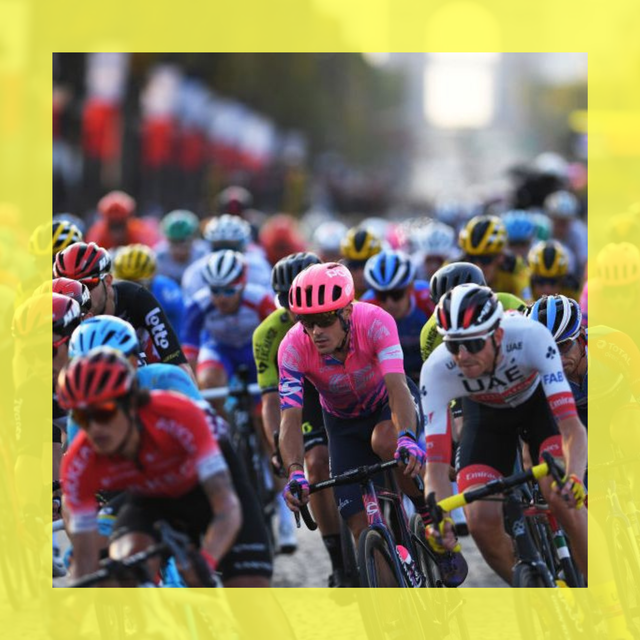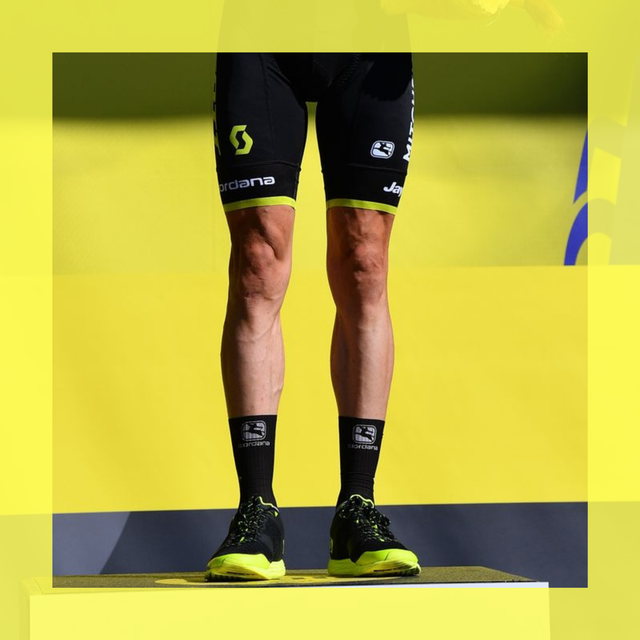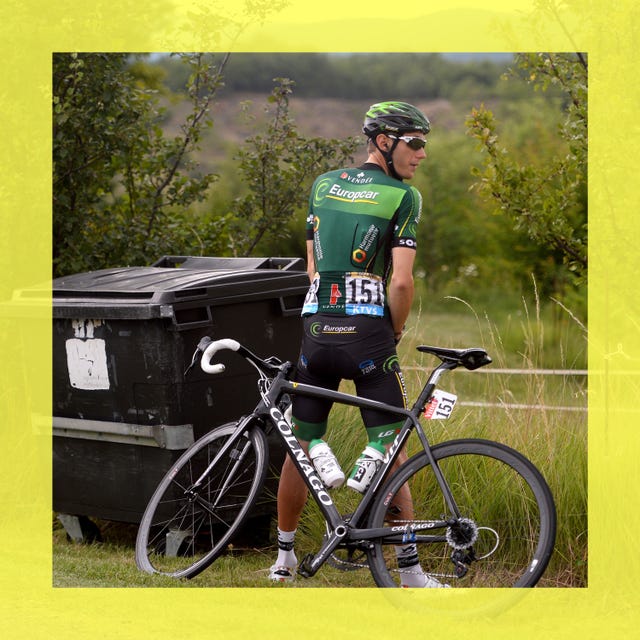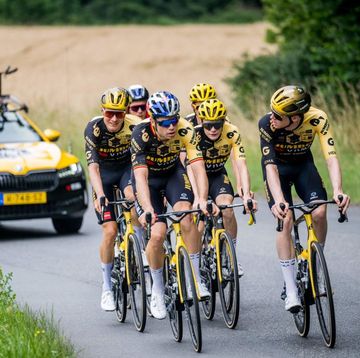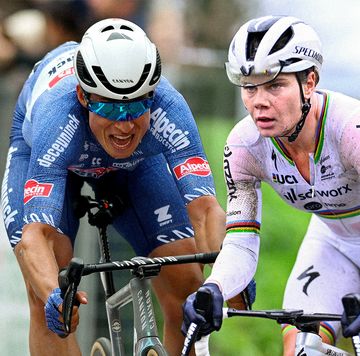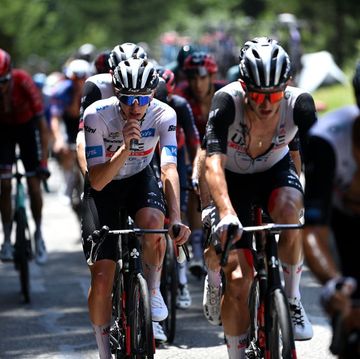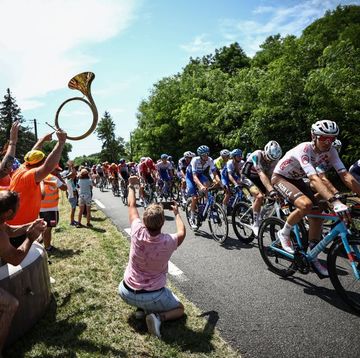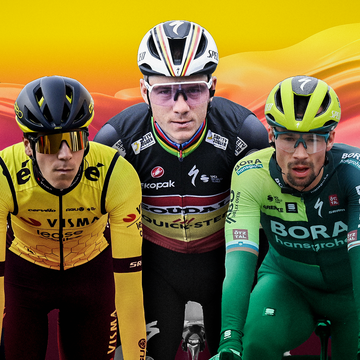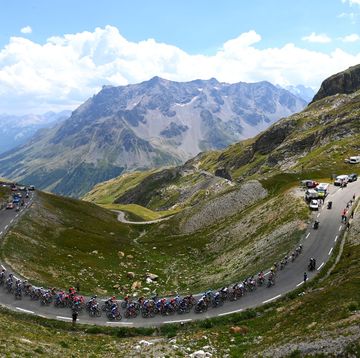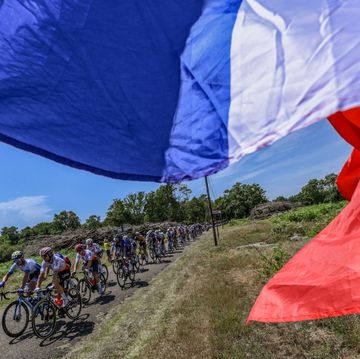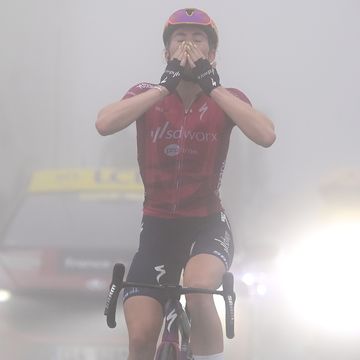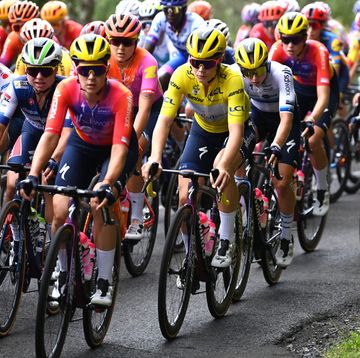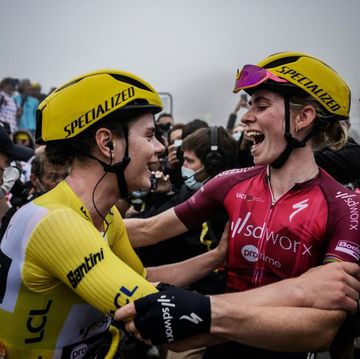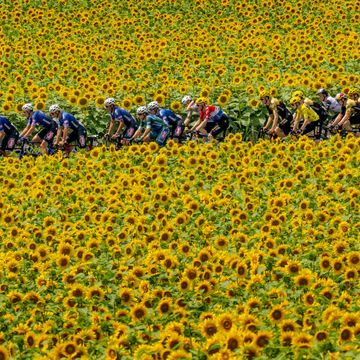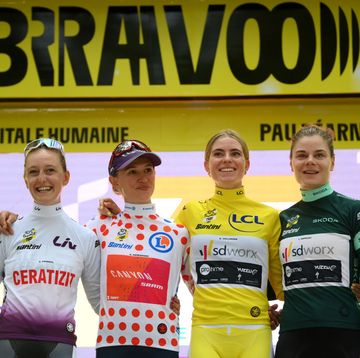The 2021 Tour de France is in the books, and what a Tour it was! Won by Slovenia’s Tadej Pogačar (UAE Team Emirates), this year’s French grand tour was defined by crashes, comebacks, and a little bit of scandal.
Here’s a look at a few of this year’s biggest winners—and losers.
Winners
Tadej Pogačar (UAE Team Emirates)
Consider the manner in which Pogačar won: The Slovenian dominated the race in a way we haven’t seen in years, winning three stages and—for the second year in a row—the yellow, white, and polka-dot jerseys.
Credit Pogačar for taking advantage of a wonky first week in which almost everyone hit the deck at least once. Yes, he crushed the Tour’s first individual time trial on Stage 5, but it was really the weekend in the Alps where he essentially won the Tour. Knowing that Jumbo-Visma was reeling and INEOS-Grenadiers was rising like they had the yellow jersey, Pogačar went on the offensive, attacking on both Alpine stages to add more time to his already formidable advantage. By the first rest day, the Tour was essentially over.
→ Sign up for Bicycling All Access for the latest cycling news, fitness tips, and gear reviews 🚵♂️
Pogačar has now won four of the five stage races he’s entered this year—and finished second in the fifth. He also won his first one-day Monument (Liège–Bastogne–Liège) and now heads to the Olympics where he’ll be one of the top favorites for Saturday’s road race. Based on what we saw during the Tour’s final week—when he won back-to-back summit finishes—we have a hard time discounting his chance to add a gold medal to his yellow jersey.
Mark Cavendish (Deceuninck-Quick Step)
We’ve written a lot about Mark Cavendish’s incredible Tour, but frankly, it was probably the best storyline of the entire Tour de France. In case you hadn’t heard, Cav wasn’t on the initial Tour roster, but he earned a last-minute call-up thanks to a knee injury sustained by Ireland’s Sam Bennett, who won two stages and the green jersey in last year’s Tour. Well, the rest was (literally) history, as Cav won four stages and the second green jersey of his career. More importantly, those four stage wins brought Cav’s career tally to 34, tying him with Eddy Merckx for the most stage wins in Tour history.
Yes, Cav’s YOLO Tour ended on a bit of a sour note after fan videos caught him berating one of his mechanics prior to the start of Stage 19—and he subsequently failed to break Merckx’s record—but Cav was still the biggest (mostly) feel-good story of the 2021 Tour de France.
Wout van Aert (Jumbo-Visma)
A bit overshadowed by Pogačar and Cavendish, Belgium’s Wout van Aert had a Tour de France that reminded us of French legend Bernard Hinault. A rider who proven himself capable of winning on just about any terrain, the Belgian champion won three stages: the Mont Ventoux stage (Stage 11), the Tour’s second individual time trial (Stage 20), and the final stage on the Champs-Élysées (Stage 21). That’s an impressive collection of stage victories for someone who came into the sport as the man many assumed would become Belgium’s next king of the cobbled Classics (he’s on his way to doing that too). Next, Van Aert heads to the Olympic road race, where he’s probably the rider most likely to give Pogačar nightmares—especially if a small but select group ends up sprinting for the gold medal.
Denmark
Riding his debut Tour de France, everyone assumed that Denmark’s Jonas Vingegaard (Jumbo-Visma) would be one of Primož Roglič’s better domestiques—especially in the mountains. But when Roglič crashed on Stage 3 and Vingegaard finished third in the Tour’s first individual time trial on Stage 5, suddenly it looked as if the team had a new leader on its hands.
Sure enough, Roglič abandoned the Tour before Stage 9 and Vingegaard went on to be the only rider in this year’s Tour who can say he dropped Tadej Pogačar (just for a few minutes near the top of Mont Ventoux at the end of Stage 11). The 24-year-old ended his maiden Tour in second place overall, the highest placing for a Dane since Bjarne Riis won the race in 1996.
As if having a bona fide Tour contender isn’t enough, Denmark also gets to host the first three stages of next year’s Tour. Originally planned to host the start of this year’s race, the Danish Grand Depart was pushed back a year given the logistical nightmare caused by the postponement of the Euro 2020 soccer tournament and the Summer Olympics. Let’s hope next year’s hype doesn’t prove too much for Vingegaard to handle. But for the Danish fans, having a GC contender and a Tour starting on home soil, well, that’s just about too good to be true.
Jumbo-Visma
We can’t mention van Aert and Vingegaard without giving credit to Jumbo-Visma as a whole—which is really saying something given the fact that the team finished with only four riders. The team came to the race all-in on Roglič, who basically came within one day of winning the 2020 Tour de France. But when Roglič crashed near the end of Stage 3 and then lost several minutes on Stage 7, it was clear the team needed to adjust its plans.
Well, credit the team’s directors for mastering the art of the pivot. By the end of the Tour, the team had won four stages and placed Vingegaard on the Tour’s final podium in Paris—in the same position (second) that Roglič took last year. Most teams fall apart upon losing their team captain, but not Jumbo-Visma. Instead, losing Roglič galvanized the team’s remaining riders, perhaps by giving them the freedom to ride for themselves without having to worry about letting anyone down. If the team wins next year’s Tour, they might have this year’s setbacks to thank.
Honorable Mention: Alpecin-Fenix, BORA-hansgrohe, and Specialized.
Losers
INEOS-Grenadiers
Before the Tour we predicted that INEOS would be the team most likely to defeat Pogačar and Roglič, thanks in part to the roster they had assembled, but more so for their promise to shake up the race by riding aggressively, with a strategy designed to keep their foes guessing which riders would attack on which day.
Well, that plan went out the window on the Tour’s first three stages; Richie Porte and Tao Geoghegan Hart lost minutes on Stage 1, and Geraint Thomas fell and dislocating his shoulder on Stage 3. Suddenly, the Tour’s great agitators were down to just one GC captain: Ecuador’s Richard Carapaz. But while the Jumbo-Visma team adapted, INEOS reverted back to tactics it used in the past, tactics that essentially did the work that Pogačar and his team should have been doing to defend the yellow jersey. Carapaz made some mistakes as well, attacking several times in the Alps only to be caught and eventually dropped by Pogačar.
INEOS is used to having both the Tour’s strongest team and the Tour’s strongest rider, but the past two years have proven that the British SuperTeam has few answers when presented with a rider like Pogačar. INEOS better find an answer soon, because the 22-year-old Pogačar is signed with UAE Team Emirates through 2026. Simply buying their way to a solution isn’t going to cut it.
The French
There were more French riders in this year’s Tour (33) than any other nation, yet they won just one stage: Julian Alaphilippe (Deceuninck-Quick Step) took Stage 1 and the Tour’s first yellow jersey. But things went downhill fast: Alaphilippe lost the jersey the next day, French GC contenders started losing time, and the only French team to win a stage (AG2R), had its stage won by an Australian (Ben O’Connor, Stage 9).
This was indeed a weird Tour in which crashes and rain marred the first week and Pogačar dominated the third. But several stages went to breakaways and it’s there that the French often shine. It’s hard to place the blame on one team or rider, but home fans aren’t happy.
Peter Sagan and Nairo Quintana
It seems like only yesterday that Peter Sagan (BORA-hansgrohe) and Nairo Quintana (Arkea-Samsic) were two of the Tour’s biggest stars, winning stages, breaking green jersey records (Sagan), and soaring through the Tour’s high mountains (Quintana). But times have certainly changed.
Sagan hasn’t won a stage at the Tour since 2019 and dropped out of this year’s Tour with a knee injury prior to Stage 12. (That’s only the second time Sagan has failed to finish the Tour.) The Slovak’s rumored move to Team TotalEnergies (along with his large entourage and bike sponsor Specialized) was finally announced late in the Tour, but we can’t help but think the French team is paying for Sagan’s resume, not his future prospects. And as Quintana is finding out, the grass isn’t always greener on the French side of the fence.
Seemingly unconcerned with a high GC finish in this year’s Tour, Quintana flashed signs that his best form was on the way; he wore the polka dot jersey as the leader of the Tour’s King of the Mountains classification for five days during the Tour’s second week. But the Colombian’s challenge never materialized and our hopes of seeing Quintana win a mountain stage or keeping the polka dot jersey all the way Paris went up in smoke. Transferring from Movistar to Arkea-Samsic prior to 2020 hasn’t worked out as well as he might have hoped, and one can be forgiven for wondering if Quintana’s best years are behind him—and where he’ll land when his current contract expires at the end of the next season.
Transparency
Yes, Bahrain-Victorious won three stages, but given the fact that the team’s recent run of success has triggered an investigation into the methods by which the team “prepares” for its races, you’re excused for feeling a bit skeptical.
And Pogačar’s not exempt either. The 22-year-old’s dominance has raised quite a few eyebrows, and his answers to questions about his own performance are rather weak. Releasing his power data might be a good start, but in a sport for whom the phrase “where’s there’s smoke, there’s fire” often rings true, let’s just hope that Matej Mohorič’s victory “salute” at the end of Stage 19 doesn’t turn out to be the moment for which the 2021 Tour de France will ultimately be remembered.
Honorable Mention: Israel Start-Up Nation, Lotto-Soudal, and Movistar.

Since getting hooked on pro cycling while watching Lance Armstrong win the 1993 U.S. Pro Championship in Philadelphia, longtime Bicycling contributor Whit Yost has raced on Belgian cobbles, helped build a European pro team, and piloted that team from Malaysia to Mont Ventoux as an assistant director sportif. These days, he lives with his wife and son in Pennsylvania, spending his days serving as an assistant middle school principal and his nights playing Dungeons & Dragons.

